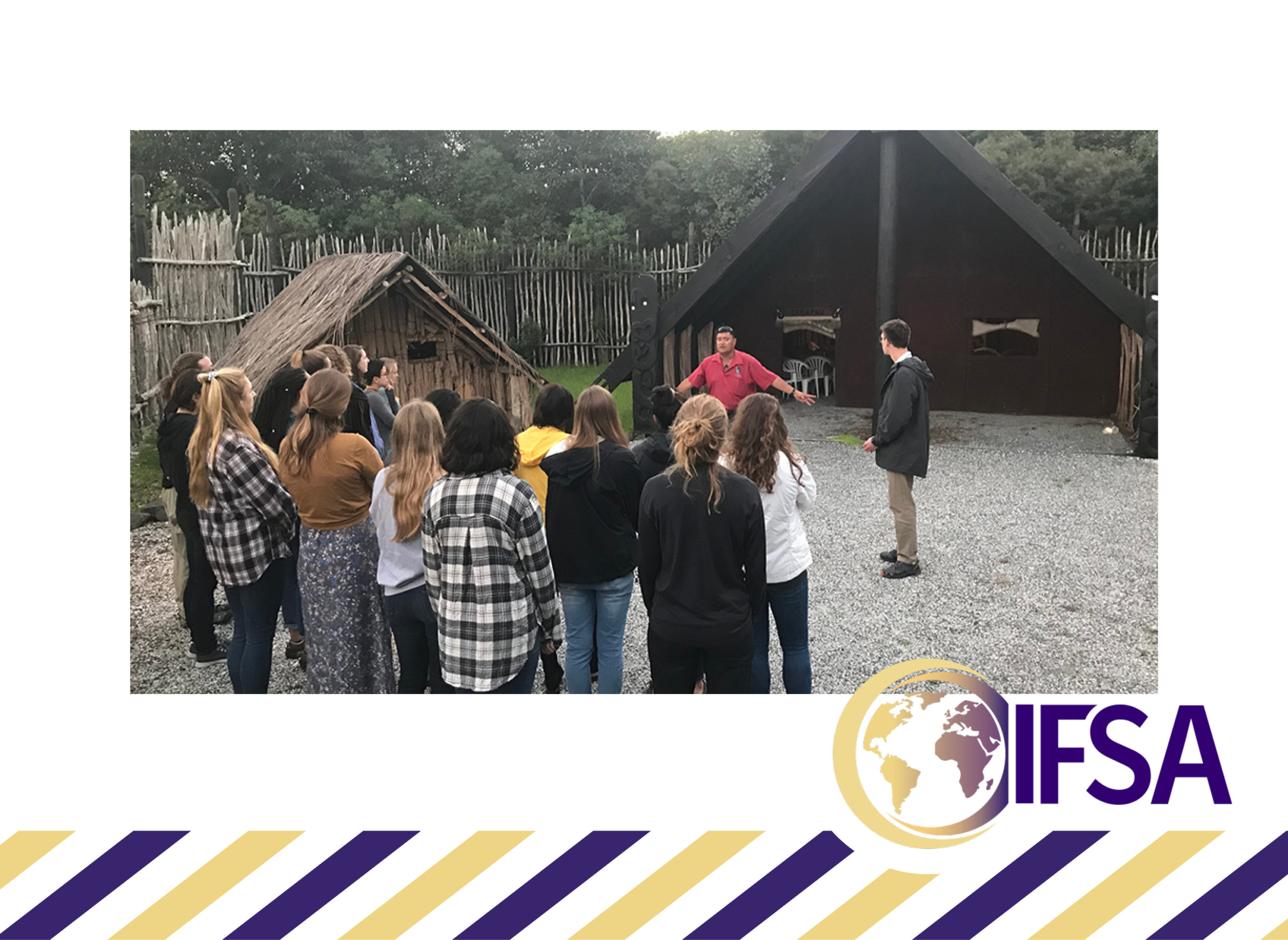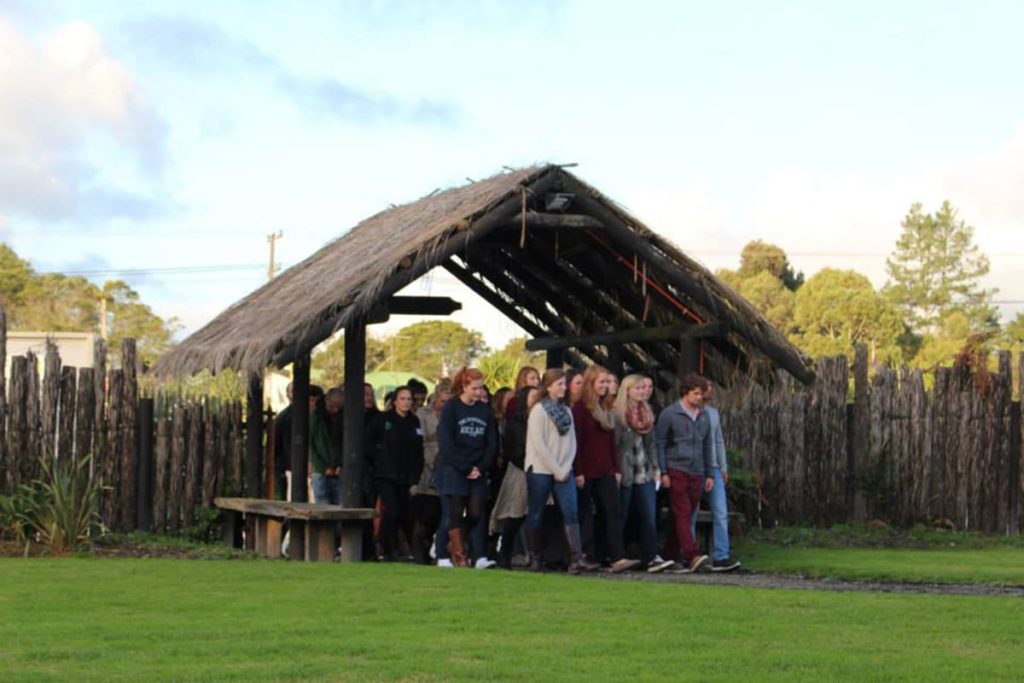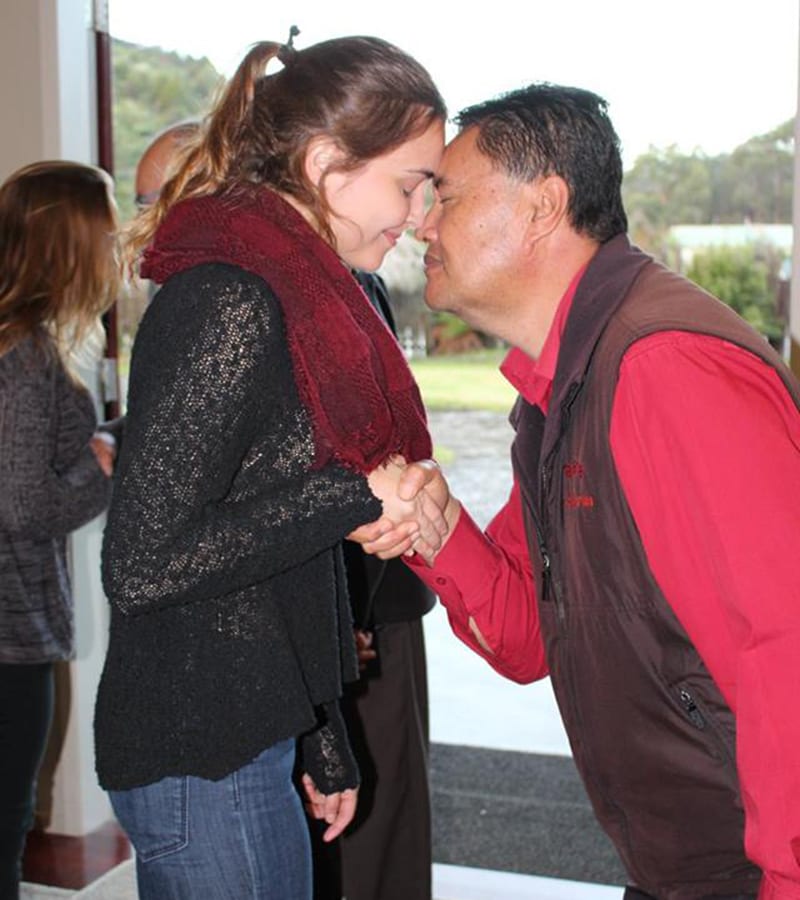Engaging in the Host Community Improves Students’ Experience in New Zealand


November 19, 2020
In 2021, IFSA New Zealand will mark a 10-year partnership with Te Hana Te Ao Marama Māori Cultural Centre. Te Hana Te Ao Marama is an educational marae with a mission to “share with the world our culture, our history, our stories” so it feels appropriate to take this opportunity during International Education Week to help the marae extend its mission by sharing the influential experiences IFSA students have there as part of the IFSA orientation in New Zealand.
IFSA students spend the final night of orientation at the educational marae, and they have the privilege of learning tikanga Māori (customs/protocol) from Matua Tom of the Ngati Whatua iwi (tribe). This experience is a first-hand expression of manaakitanga which plays a key role in Māori culture. Manaakitanga encompasses showing aroha (love), hospitality, generosity, mutual respect and prestige to guests. Matua Tom, his iwi and whanau (family) embody manaakitanga at every stage of the encounter.
Part of our intent in arranging for this experience is to help our students find and appreciate a sense of community on their IFSA program. In Māori culture, this sense of community relates to the Māori concept of kotahitanga, which is about togetherness and lifting each other up, identifying as a community, sharing the earth, extending support to everyone, and receiving the same back.
Preparation Before the Visit

Our host provides a briefing for our students before they visit the marae to give context about the marae as a community centre and the features that make up the complex as they relate to important cultural concepts. Students must also learn the specific protocol for the respective marae as they can differ between iwi. The female members of the guests must nominate speakers to act as rangatira (chiefs) and speak in Māori to the kaumatua (elders) on their behalf. The students learn two Māori songs which they will sing after the rangatira speak.
IFSA students also prepare a brief pepeha (introduction) in Māori which identifies where they are from in reference to their nearest mountain, river, sea/lake. Connectedness to land, waterways and common ancestors is central to whakawhanaungatanga (getting to know each other/relationship building) on the marae. Māori believe that the earth is taonga (treasure) from ancestors and should be protected for future generations. In Māori culture, you extend kaitiakitanga (guardianship) by respecting and conserving the sky, land and sea and being mindful of the impact of your behavior and giving back to these resources, rather than exclusively taking from them.
Formal Welcome and Overnight Stay

At the marae, students are met at the waharoa (gateway) to prepare for the powhiri (formal welcome). The waharoa at Te Hana Te Ao Marama is called Nga Waka Tuhono, which translates as ‘the coming together of canoes’ as the marae is a place where people are welcome to gather from all over New Zealand and the world. The tangata whenua (first people) of Aotearoa arrived by huge waka (canoes). In contemporary times, the ‘waka’ is usually a Boeing jet.
It is not respectful to walk onto the marae atea (sacred space in front of marae) without hearing the karanga (call) of the kuia (elderwoman) of the tribe. The rangatira give their speeches supported by the group singing, and the guests then hongi (lightly press noses) with the taumata (hosts). The hongi is the highest form of honor to bestow on guests as by touching noses and breathing deeply, they are sharing their life force.
We then move into the dining hall to eat a hangi (smoked/steamed meal) together and lift the tapu (sacredness) of the meeting to noa (make normal). We then take a tour of a 17th century replica village and enjoy kapa haka (cultural performance) and stories to gain an insight of what life was like before European settlement. A highlight for students and staff is the noho marae (overnight stay) where we all have a turn to stand up and share our pepeha and sleep in the wharenui (big house). The wharenui at Te Hana Te Ao Marama is called Nga Whetu o te Rangi (a myriad of stars) because of the twinkling lights on the ceiling to represent the night sky.
A Proper Farewell
After some more amazing kai for breakfast prepared by the hardworking ringa wera (hot hands) in the Te Hana Te Ao Marama kitchen, it is time to bring our visit to a formal close. Just as you should not walk on to a marae without being welcomed, you should not leave the marae without a poroporoaki (farewell). This is an opportunity for our students to stand up and thank the hosts for the manaakitanga they have shown. Our students are always incredibly eloquent in their praise because their gratitude for the experience is sincere.
We present the taumata (host) with a koha (gift) which is usually a native tree to be planted on the marae. By giving this koha, every one of our students who has visited Te Hana Te Ao Marama has a connection to that whenua (land).
As we depart Te Hana Te Ao Marama with a blessing from the kaumatua and start the journey to our respective host cities, there is a genuine sense of kotahitanga (togetherness and community).
This Maori proverb summarizes Te Hana Te Ao Marama’s commitment to education:
“He aha te mea nui? He tangata. He tangata. He tangata.”
If you were to ask what the most important thing in the world is, then I would have to answer. It is people. It is people. It is people.
Kia Ora Te Hana Te Ao Marama! Thanks to You!
We are extraordinarily grateful for our partnership with Te Hana Te Ao Marama over the last ten years. We are especially grateful for the many IFSA students who have been enriched by this experience so early in their time in Aotearoa New Zealand. The connection that started at the marae created a lasting connection to New Zealand, the people, and each other.